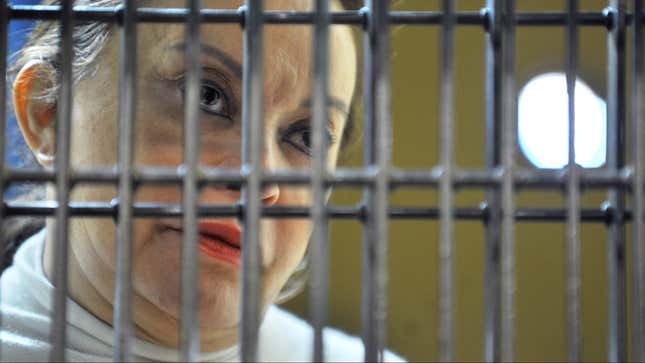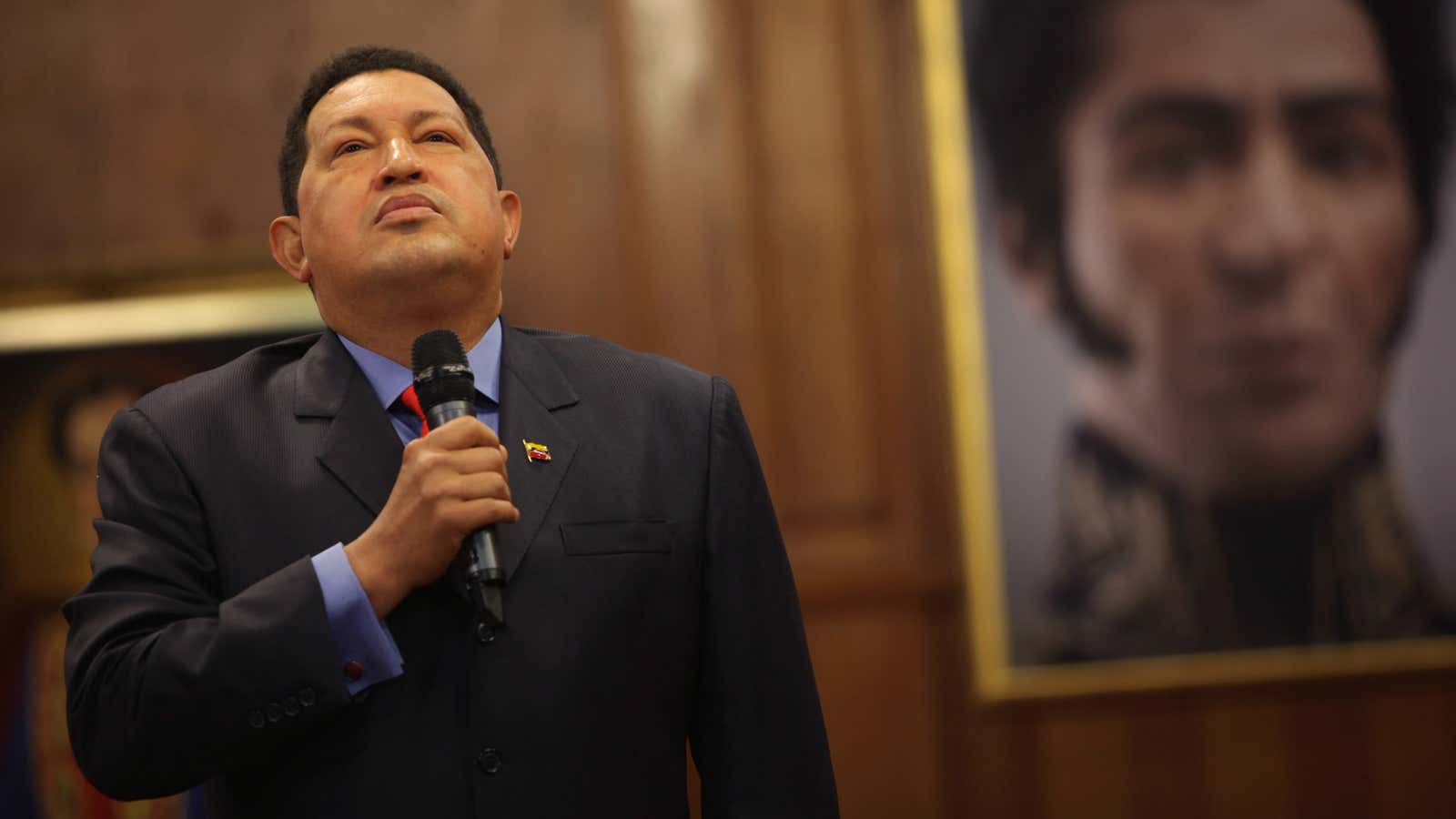Within a few days, two classically Latin American characters went through radical rites of passage—Hugo Chávez died yesterday, and a week previous, the less well-known but equally archetypical Elba Esther Gordillo was imprisoned in her native Mexico after being charged with embezzlement. Chávez was the standard Latin American caudillo (military dictator) and Gordillo, called “La Maestra” (The Teacher), was the epitome of the corrupt Latin American union boss. She was, for 17 years, the head of the Mexican teachers’ union, which, with 1.5 million members, is the largest union in Latin America. She used union contributions of Mexican teachers to become a millionaire who flew in private jets, owned two mansions in San Diego, California, and spent $3 million shopping in Neiman Marcus alone. She and her allies had other sources of income, though. She turned the union’s control over all teaching positions in the country into a private ownership system—ownership meaning that union bosses could inherit, bequeath, sell or rent these positions to other people.
Neither Chávez nor Gordillo used their power to help their constituencies. For 14 years, Chávez spent unprecedented amounts of government resources in building an international leadership position and used it to present an image of macho opposition to the United States, capitalism and liberal democracy. For all this rhetoric, at the end of this period, the Venezuelan people remain poor and underdeveloped. For 17 years, La Maestra opposed all attempts to modernize the Mexican educational system and upgrade the teachers’ skills. As a result, Mexico’s education standards are still poor and the teachers have failed to attain the standard of living that a more educated society would afford for its civil servants.
It is puzzling how characters like these become so powerful in Latin America or elsewhere. It would be easier to understand if what they offered were good bread and high-quality circus, as the Roman emperors used to do. In the case of these Latin American caudillos, however, the bread they offer is rotten and the circus is corny.
Not the greatest show on earth
Chávez was fascinated by modernity. He called his political movement “Socialism of the 21st century” and spoke of himself as the avatar of new historical trends. However, he was just one of the long line of populist caudillos that have ruled Latin American countries since their independence about two centuries ago. Like his predecessors in this long line, he did not have any vision for his country beyond what was needed to keep it under his control. The Socialism of the 21st century does not have any intellectual or practical content whatsoever. It has been what Chávez wanted it to be in any particular moment. Actually, he never wanted anything systematic to stand in the way of his arbitrary acts. It was the arbitrary nature of his rule that allowed him to stay in power.
Like his predecessors, he owed his power and popularity not to successful economic and social policies but, instead, to his command over a vast network of patronage. He funded this network with the country’s oil revenues, which boomed during the last 9 of his 14 years as president. But, in spite of the enormous waves of wealth that oil brought to his country during his tenure, he ran a society of acute scarcity. During the last several years, Venezuela has suffered from the worst inflation rates in Latin America (on the order of 30% when the average in the rest of the region was around 2% to 3%), from severe shortages of essential goods and from a lack of the foreign exchange needed to import them. In the classic Latin American caudillo style, he did that on purpose. He wanted everything to be scarce, except when he personally handed out benefits to his supporters and political operators. Chávez had all the dollars he wanted; the average Venezuelan had close to none. That was Chávez’s advantage.
It was not difficult for Chávez to create scarcity in Venezuela. He diverted most of the country’s oil revenues away from activities that would help develop the country. Domestically, he enriched his supporters rather than investing for the benefit of the population at large. Moreover, he spent enormous amounts of money abroad in his attempt to become a continental leader and challenge the United States as the dominant power in the region. In the process, he acquired several client states, including prominently Cuba and Nicaragua, and influenced several small countries in the Caribbean, Bolivia, Ecuador and even Argentina. The amounts involved were massive. For the last several years, Venezuela transferred Cuba $10 billion to $15 billion per year—a huge amount for a country like Venezuela, which still has enormous pockets of poverty.
Gordillo operated in the same way, running an economy of scarcities. She controlled the supply of job positions, and gained power by allocating them as a sign of benevolence or in exchange for economic and political favors. In this way, she and Chávez and all the Latin American caudillos perfected the art of charging a political and economical price for things that should go for free in a decent society—job opportunities, freedom, and other individual rights. They turned rights into privileges and profited from this.

People looking for signs in the chronology of events may think that it was auspicious for the region that two emblematic representatives of the old Latin America would become inactive within a week. Their coincidental demise may augur the passing away of old ways of life that have kept the region underdeveloped. It may, however, be a mere coincidence. And, more importantly, the region is not underdeveloped because it has this kind of leadership. It has this kind of leadership because it is underdeveloped.
Thus, mending its ways will take much more than the demise of characters that have taken advantage of its underdevelopment to build personal empires of political and economic power. To get better leaders, the region must change itself. But what needs to be changed? What is the fatal weakness?
The fatal weakness
The appeal of populist caudillos is deeply rooted in the social order that all Latin American countries shared in the distant past. For centuries, patron-client networks have determined the shape of the Latin American economy in a symbiosis that ultimately prevented the creation of a social order based on impersonal institutions.
The symbiosis between caudillos and Latin America began during the colonial era, when economic success depended on the favor of the Spanish sovereigns and their representatives in the region. There were three main ways to become rich: mining, plantations and commerce. Getting into all of them required the explicit authorization of the sovereign. Thus, the idea that riches flowed from the government became natural for both rich and poor Latin Americans.
The caudillos capitalized on this attitude of dependency. Beneath their high-flying rhetoric, what sustained the power of the caudillos was a simple deal: people delivered their freedom to the caudillo in exchange for material goods—just as it had been with the king and Spain. That is, in spite of its democratic protestations, Latin America chose to live under the archaic social order of feudal Europe.
At the core of this choice is the lack of self-reliance. It is not a coincidence that the first thing that caudillos do is to blame the developed countries (and particularly the United States) for the poverty of Latin America. The second thing they do is to promise instant riches that will come from the state. Believing in this promise, which has proven false for 200 years, has been the weakness of Latin America. What Latin America needs to understand is that self-reliance is the basis of all social progress.
Looking at the events of the last week from this perspective, it becomes clear that the fall of La Maestra is much more auspicious for the progress of Latin America than the demise of Hugo Chávez. The fact that the government could end her corrupt reign, and with the full support of the electorate, shows that, at least in some parts of Latin America, the population is starting to stamp out the corrupt caudillos that have plagued its past. This process is not exclusive to Mexico. It is happening in many other countries as well. Slowly, Latin America may be moving away from its tradition of a lack of self-reliance. This is what it needs to develop at long last.
